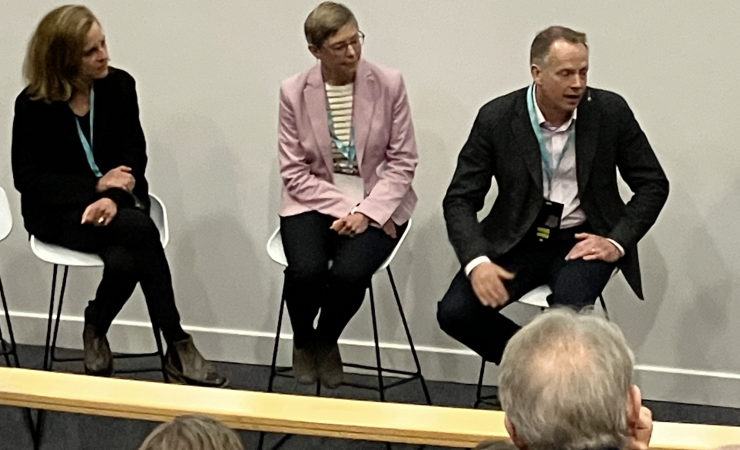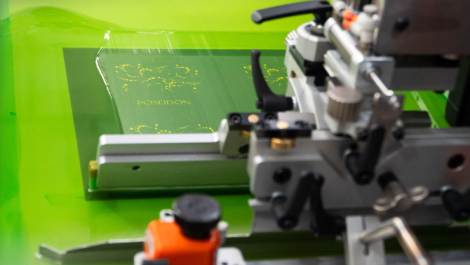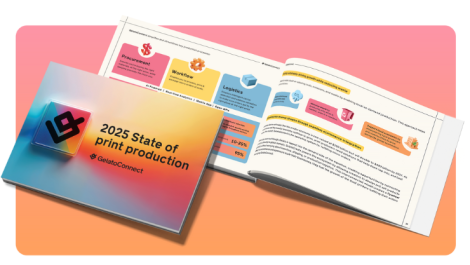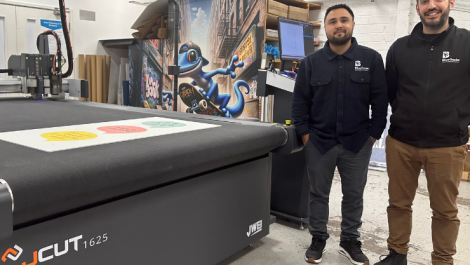The Visual Media Conference (VMC) celebrated its tenth anniversary on 4 April with a wide-ranging programme of presentations from a variety of brands and businesses, reflecting innovative and flexible responses to the challenges brought by the Covid pandemic and subsequent economic difficulties.
Highlights for printers included an Intergraf panel in which Sabine Gelderman of drupa, Beatrice Klose of Intergraf and Charles Jarrold of the BPIF shared views on challenges and responses facing printers and allied businesses from global, European and UK perspectives respectively. While local UK concerns around skills shortages and energy costs were familiar topics, Ms Klose also noted uncertainties around the impacts of sustainability regulations and customer demands, plus the effects of an ongoing ‘digital-first’ focus from both business and government. Ms Gelderman added that from the global perspective geopolitics and supply chain disruption were still big issues and noted the difference between mature and growing economies, with commercial print essentially flat in the latter, with printers looking to diversify into packaging, large format or textile work.
Suggestions for opportunities came in the form of seeking partnerships or collaborations, including with brand owners, and increased focus on sustainability and carbon footprinting, which Mr Jarrold said was holding up well in the face of economic pressures this time. To address the skills shortages, more and closer ties with educational institutions and school and college/university level were proposed. The single-line take-aways were around communication, with Mr Jarrold encouraging printers to ‘talk to people you don’t know’.
The topic of AI (artificial intelligence) was central to a presentation by Aylet Szabo-Melamed, VP of marketing for XMPie, who said that it was needed to digest ‘big data’ and pointed delegates to an online demonstration in which ChatGPT was used to generate marketing materials based on a name and email address only. She also outlined the dangers to brand values posed by AI- or user-generated content, while underscoring the high ROI that print as medium offers marketers, who too often see it as difficult to incorporate into their campaigns, despite its sustainability credentials.
A panel discussion on attracting talent covered issues around the lack of awareness of print as a challenging and stimulating career opportunity, while examining the factors that made for a good workplace. These range from collaboration and cross-functional working, sympathetic cultural and aspirational values to a sense of purpose, challenge, opportunity and reward. The role of industry bodies such as the BPIF and Dscoop for networking and mutual support was emphasised.
A sustainability panel investigated ‘greenwashing’ claims, methods of advancing the conversation by reflecting nuance and recognising that not everything can be fixed at once, ‘progress rather then perfection’ as Ryan McSorley, co-founder of product design agency Neat put it. Jonathan Tame of print and paper advocacy group Two Sides commented that ‘retailers are looking to the supply chain for solutions’, and further noted that views had changed over who was responsible in the last couple of years, with a shift from consumer responsibility to governments and brands. He also felt that sustainability issues had not dropped off the agenda in the current cost crisis.
Asked whether short-termism was the biggest barrier, Barnaby Patchett of sustainability communications agency One Nine Nine warned that this can ‘lead to unintended consequences, we need the bigger picture’, though he also thought that ‘short term wins can fit in with this’ if properly conceived. Carbon offsetting was discussed, in the light of reports that some forestry credit schemes were unreliable. Mr Tame agreed felt that forestry protection and expansion was a critical part of carbon mitigation, though Mr McSorely pointed out that it was ‘part of a holistic approach, not a silver bullet’. One thing the panel was united on was that there was ‘no downside’ to reducing waste, with Mr Patchett giving the novel example of a client that turns orange-peel waste into cleaning solutions.






